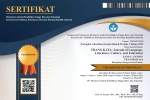Modern Myth and Japanese Cultural Representation in Miyazaki’s Picture Book Spirited Away
DOI:
https://doi.org/10.54923/jllce.v6i1.162Keywords:
Modern myth, Japanese culture, semiotic analysis, Roland Barthes, Spirited AwayAbstract
Modern myths remain highly relevant today as they are expressed through stories and symbols that shape cultural identity. Spirited Away is one such work, and while previous studies have examined it from the perspectives of culture, identity, hero’s journey, ecology, feminism, and postcolonialism, few have analyzed it specifically as a modern myth. To address this gap, this study applies Barthes’ semiotic theory to explore how the story constructs modern myths that reflect Japanese culture. The study aims to 1) identify representations of Japanese culture in Spirited Away; 2) analyze how modern myths are constructed using Barthes’ semiotic framework; and 3) explore the cultural implications of these myths in the story. Using a qualitative approach and Barthes’ semiotic framework, the research analyzes signs and symbols at both the denotative and connotative levels. Through this analysis, the findings show that cultural elements such as food, work, names, spirits, and love are transformed into modern myths that naturalize values of identity, togetherness, spirituality, and morality. Thus, Spirited Away not only reflects Japanese culture but also communicates ideological messages that influence how people perceive values and social life in Japan.
Downloads
Downloads
Published
How to Cite
Issue
Section
License
Copyright (c) 2025 Mutiara Safitri, Rahayu Puji Haryanti

This work is licensed under a Creative Commons Attribution-ShareAlike 4.0 International License.





